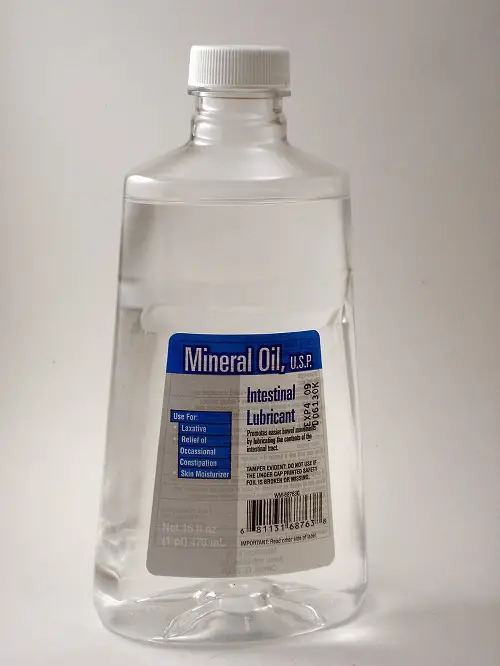Castor Oil vs Mineral Oil for Constipation? If this question is bothering you as well, this article will help clear all your confusion today.
Constipation is a common issue that affects almost every age group. However, natural solutions like using castor oil or mineral oil can be of great help. But this leads to the comparision—castor oil vs mineral oil for constipation!
What is Castor Oil?
Castor oil, extracted from the seeds of the castor plant, has been used for centuries in various cultures, especially in Africa, where it originates. Today, it’s grown in tropical and subtropical regions worldwide and is known for its diverse applications in medicine, cosmetics, and even industry.
Medicinally, castor oil is often used as a natural laxative, thanks to its high content of ricinoleic acid—a fatty acid with potent anti-inflammatory properties. This acid stimulates the muscles in your intestines, helping to ease bowel movements and relieve constipation.
Dr. Josh Axe points out that castor oil’s benefits extend beyond just digestive health. He mentions that “castor oil is also widely used for its ability to boost circulation and detoxification, and it can even support lymphatic drainage when applied topically.”
What is Mineral Oil?

Mineral oil is a clear, odorless oil derived from refining crude oil. Unlike vegetable-based oils like castor oil, mineral oil is petroleum-based and has been widely used in various industries, including cosmetics, pharmaceuticals, and mechanics. It’s often found in products like baby oil, moisturizers, and laxatives.
One of the primary uses of mineral oil in wellness is as a skin moisturizer. It works by creating a barrier on the skin’s surface that helps lock in moisture, making it particularly effective for treating dry skin.
In the medical field, mineral oil is also used as a mild laxative, similar to castor oil, but it works differently. Instead of stimulating the intestines, it coats the bowel, making it easier for stool to pass through.
Castor Oil vs Mineral Oil for Constipation

Both castor oil and mineral oil are commonly used as laxatives to relieve constipation, but they have different properties and mechanisms of action.
1. Source
Castor oil is derived from the seeds of the castor bean plant thus making it a natural option. Mineral oil, on the other hand, is a petroleum-derived product, indicating a synthetic source.
2. Effectiveness
Both castor oil and mineral oil are effective laxatives, but they have different mechanisms. Castor oil is a stimulant laxative, promoting bowel movements by increasing intestinal muscle activity. Mineral oil, a lubricant laxative, helps stools pass by coating them and the intestinal walls. The effectiveness can vary based on individual responses and preferences.
3. Onset of Action
In terms of onset of action, castor oil typically induces bowel movements relatively quickly after ingestion (2-6 hours). The stimulant effect hastens the natural movement of the intestines. Mineral oil, being a lubricant laxative, may take a bit longer (6-8 hours) to produce its effects as it relies on the smooth passage of stool facilitated by the lubricating action.
4. Safety
Safety is a crucial factor when choosing laxatives. Excessive use of castor oil may lead to dehydration, electrolyte imbalance, and abdominal cramping. Mineral oil is generally considered safe, but extended use may interfere with the absorption of fat-soluble vitamins.
5. Pregnancy and Breastfeeding
The use of laxatives during pregnancy and breastfeeding is a topic of consideration. While mineral oil is generally considered safe for short-term use, castor oil is sometimes suggested to induce labor. However, its use for this purpose should only be undertaken under the guidance of a healthcare professional due to potential risks.
6. Environmental Impact
Considering the sources of these laxatives, castor oil derived from plant seeds might be perceived as more environmentally friendly compared to mineral oil, a petroleum-derived product.
7. Stool Softening
Both castor oil and mineral oil soften stools. Castor oil stimulates fluid secretion, while mineral oil coats stools and intestinal walls to prevent excessive dryness. Combining them with stool softeners provides comprehensive relief for constipation, especially with hard stools.
8. Use in Children
The castor oil is not recommended for use in children as its strong laxative effect may be too harsh for their systems. on the other hand, mineral oil can be used cautiously in children under medical supervision, especially for short-term relief.
Conclusion
When deciding between castor oil and mineral oil for constipation relief, it’s crucial to consider individual preferences, tolerances, and the severity of the condition. If quick action is needed, castor oil might be a preferable choice. However, if a gentler approach is desired or if there are concerns about potential side effects, mineral oil could be a more suitable option.
